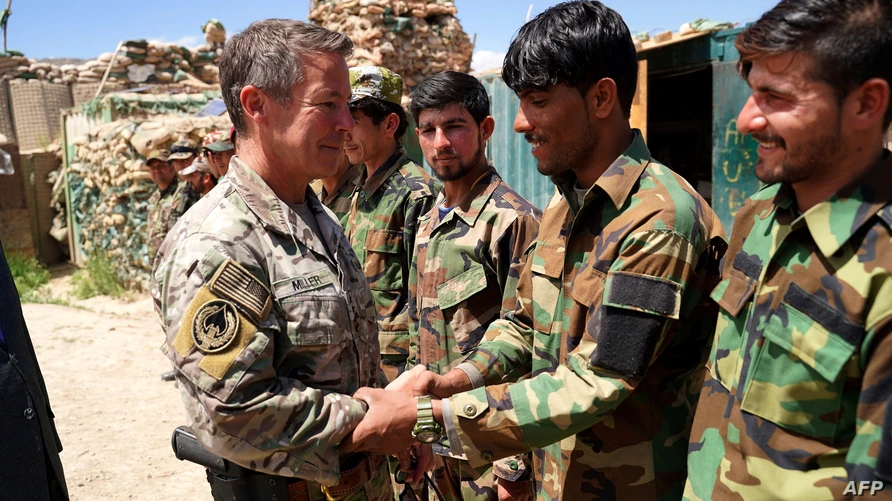Taliban Gains Worry Top US General in Afghanistan

The commander of American troops in Afghanistan said Tuesday he was deeply concerned about the deteriorating security situation in the country, as U.S. and NATO militaries plan to fully withdraw by September 11.
Gen. Austin Scott Miller, who is overseeing the troop exit, made the remarks as battlefield hostilities between Taliban insurgents and U.S.-supported Afghan government forces have escalated across the conflict-torn nation.
Speaking to reporters in the Afghan capital, Kabul, the general described the security situation as “not good right now.” He said recent insurgent territorial gains were concerning and cautioned the Taliban against attempting to take control of the country by force.
“A military takeover is not in the interest of anyone, certainly not for the people of Afghanistan,” said Miller.
The Taliban claim to have captured more than 100 of the country’s 419 districts since May 1, when the last remaining U.S. and allied soldiers formally began leaving Afghanistan after almost two decades.
Afghan officials said security forces have retaken some of the districts in recent days and vowed to evict insurgents from others.
Miller acknowledged that any loss of territory impacts overall security in the country.
“Because districts start representing key terrain as it relates to security of the people, of the provincial capitals and certainly security of the capital,” said the U.S. general.
He also cautioned that pro-government militias being deployed around the country to help the beleaguered Afghan security forces in containing Taliban advances could plunge the country into civil war.
But despite the violence, Miller stressed, the troop withdrawal process remains on track in line with orders U.S. President Joe Biden issued in mid-April.
“I don’t anticipate a change in my orders that we received in April. We are executing those orders,” Miller told reporters.
End to air support is near
Afghan forces have for years heavily relied on close U.S. air power in battles against the insurgents. But the withdrawal of American military has ended that cover, though not until all U.S. soldiers are out of the country, Miller insisted.
“I still have the authority to support and defend the Afghan security forces and certainly defend ourselves as well,” he said.
The military drawdown stems from a February 2020 agreement Washington negotiated with the Taliban in Doha, Qatar, to close what has been the longest war in U.S. history.
The deal bars U.S. airstrikes on insurgent positions in return for a Taliban ceasefire with foreign troops and counterterrorism assurances. But the Taliban in recent days have accused Washington of launching airstrikes against their fighters in violation of the deal even as U.S. troops withdraw.
“I have actually told the Taliban that just stop the offensive operations and airstrikes go to zero as we go forward,” said Miller.
The insurgents recently also captured a key border crossing with Tajikistan in northeastern Afghanistan and they have encircled almost all major cities.
Miller emphasized the need for Afghan government and Taliban negotiators to return to the negotiating table in Doha to seek a political settlement to hostilities.
Talks with Taliban have stalled
The two negotiating teams have been holding talks in the Qatari capital since last September but the process has not met with any success and has stalled for months, with each side blaming the other for the deadlock.
“The way it must end for the Afghan people is something that revolves around a political solution,” said Miller. “I have also said that if you don´t reduce the violence, that political solution becomes more and more difficult.”
Miller refused to say where the U.S. and its NATO allies were in the withdrawal process. The U.S. military announced a week ago that more than 50% of the retrograde process had been completed.
Private militia forces used
Gen. Ajmal Omar Shinwari, spokesman for the Afghan security sector, defended the deployment of private militia forces, saying they were all citizens of the country who had come out in support of their national security forces against the Taliban.
Shinwari told reporters, however, the private forces were working under the command of the Afghan army and were not allowed to take any action independently.
The spokesman also revealed that a new “rapid reaction force” comprising 4,000 retired army officers had also been created to fight alongside the regular army.
Meanwhile, the Taliban renewed their pledge Tuesday that insurgents were determined to ensure security of diplomats, embassies, foreign non-military and civilian nationals as well as humanitarian groups working in Afghanistan.
“They may continue their diplomatic work and humanitarian activities per normal routine,” the statement said. The insurgent group issued a similar statement earlier this month.
Taliban spokesman Zabihullah Mujahid told VOA that envoys of a number of foreign countries recently held meetings with insurgent leaders in Doha to express concerns about safety of their citizens” in the wake of increased violence in Afghanistan.
